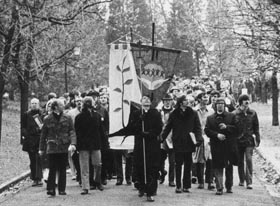“The Lutheran Church—Missouri Synod (LC-MS) is a problem—for the historian, at least. And the problem, stated simply, is this: Where exactly does one place the LCMS in the larger landscape of American Christianity? Obviously we’re not Roman Catholic. But does that make us Protestant? No, we’re Lutheran, we answer. But that won’t do for the demographers; they need a category. And, so, since we’re not Catholic, we get lumped in with the Protestants. However, are we Mainline Protestants or are we Evangelical Protestants? Neither, again we would say. We’re Lutheran. But what kind of Lutheran?
So goes the opening paragraph in Lawrence Rast Jr.’s article Forty Years after Seminex: Reflections on Social and Theological Factors Leading to the Walkout, appearing in Concordia Theological Quarterly, volume 80, Number 3-4, July/October 2016. That opening paragraph may seem a bit off topic, but what Rast does is present his case for the LCMS as a denomination that is influenced by its culture, not only today but since its very beginnings. The “kind” of Lutheran the LCMS is, is an American Lutheran. The “walkout” is simply an expression of the LCMS reflecting the culture of the late 60s and early 70s.
 Rast concludes by writing, “The first question must be to ourselves; we must challenge ourselves to consider the ways we have embraced our culture—for good and/or ill. Only when we’ve done that can we begin to see whether we are up to our necks or in over our heads in the cultures in which the Lord has given us the opportunity to serve.”
Rast concludes by writing, “The first question must be to ourselves; we must challenge ourselves to consider the ways we have embraced our culture—for good and/or ill. Only when we’ve done that can we begin to see whether we are up to our necks or in over our heads in the cultures in which the Lord has given us the opportunity to serve.”
Whether or not you agree with Rast’s argument, his concluding thought is valid. It is impossible to live in a culture and not be influenced by it, either in endorsing it or in reacting against it. We are often blind to cultural influence. Therefore a critical self-examination of what we hold to be true, to determine if it is biblical or cultural, is a difficult task. All too often we twist the Bible to fit what we “know” to be true, even without recourse to the Divine Script.
It is not a bad thing to be part of our culture. After all, we are reaching out with the Gospel to people who are part of that very same culture. But we should not embrace an idea or belief simply because “everyone” is either doing it or believe in a certain way.
If you wish to read the article, click on the LINK
P.S. Lawrence R. Rast Jr. is Professor of Historical Theology and President at Concordia Theological Seminary, Fort Wayne, Indiana.
Blessings in Christ,
Pastor Rickert
